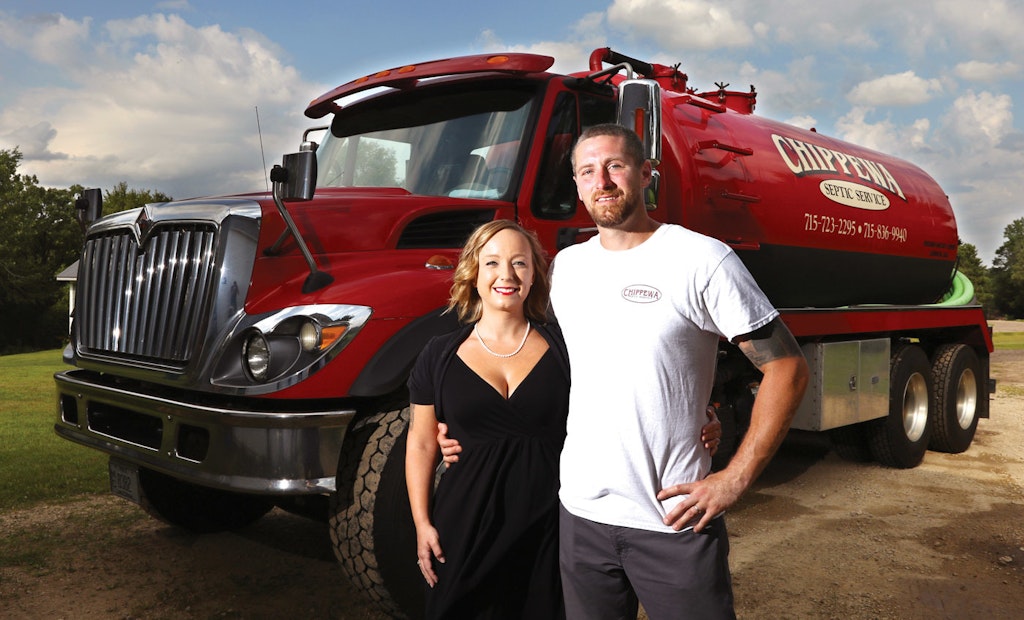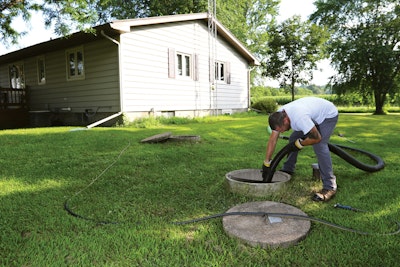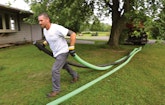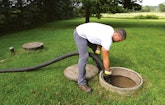
Owners Cassandra and Travis Simet are shown with their International WorkStar built out by Imperial Industries with a 4,000-gallon aluminum tank and Wittig pump (Gardner Denver). Photos by Dan Reiland
“Septic Guy Revered When Every Flush Counts” shouted the headline from a Wisconsin newspaper. The focus was on Travis Simet, owner of Chippewa Septic Service, who earned the respect of columnist Patti See when he backed down her narrow, curvy, icy driveway to pump holding tanks. Living in the midst of lakes, it was all in a day’s work for the 35-year-old pumper who took over his father’s business in 2018.
FROM TRUCKING TO PUMPING
Steve Simet was an over-the-road trucker for more than 25 years when a trucking friend told him about a relative selling his septic service business due to health issues. Travis Simet says, “My dad was getting burned out, so he had been keeping an eye out for a chance to be home. He trained for almost a year with (the former owner) and took care of all the licensing and qualifications to be a pumper.”
Simet, 16 at the time, wasn’t particularly enamored with the business.
“I remember my dad dropping me off at school (with the vacuum truck), and I wasn’t very fond of that. All the kids noticed, and Dad made sure to lay on the air horn,” he recalls.
Simet helped out at the Eau Claire, Wisconsin-based business during the summer and part time during the school year. But worked other jobs after graduating from high school — roofing for a while, then a factory job — where he learned he didn’t like being stuck inside a building.
He gravitated back to the family business in 2011 and helped his dad, with the plan to eventually take it over. That came sooner than Simet expected — in December 2017 when his parents, Steve and Debbie, took Travis and his wife, Cassandra Simet, out to dinner and said it was time for Travis to take over. Steve thought he needed rotator cuff surgery and time off to heal. Fortunately, because he stopped working and was able to rest his shoulder, he didn’t need the surgery.
OVER-THE-TOP SERVICE
Travis Simet continues the no-shortcuts and quality-work mindset his father had, and demand for his services are growing as a result. “When my dad took over, his slogan was ‘It’s important to have it done properly.’ He drilled into me that we do the best job out there and take pride in that,” Simet says.
That means using crust bars, backflushing and removing all the sludge from tanks to get down to bare concrete. Over the years, Steve Simet built tools to make the job easier, and his son continues to use the tools. Travis Simet is also careful about not tearing up the yard with the truck and about wearing clean boots and gloves when billing the customer.
All of that impressed the columnist who desperately needed holding tanks pumped in January and couldn’t find a pumper who wanted to navigate her driveway in winter. There was a good reason for that, Simet says.
“The driveway was spooky. It is long (1/4 mile), really steep and winds around a bank. There’s a hill going up and a hill going down, sporadic trees and a river at the bottom of the embankment. That was the closest to the edge of the seat I’ve been,” he explains, adding that the winter of 2018-19 was particularly harsh with a deep freeze followed by deep snow. In his area where that type of driveway is typical, Simet always backs in so he can drive out and make it back up icy hills.
Following his dad’s philosophy to “do things others wouldn’t do,” Simet agreed to give it a shot. He had no idea the customer was a writer, nor that Chippewa Septic would be featured in a column and that See would be a loyal customer after that.
BUILDING A BUSINESS
As the lone service technician, Simet focuses on pumping tanks and maintenance services. Most are septic systems, but many customers in the lakes area have holding tanks requiring routine service. One couple with three kids needs the holding tank pumped every five weeks, while many are pumped four times a year.
The percentage of commercial customers — currently about 25% of his workload — is growing. He pumps at many restaurants, large stores and some hotels. The commercial pumping and servicing of holding tanks provides year-round work, albeit challenging. “When the weather gets nasty, the more phone calls you get,” Simet says. “I could have been featured on Ice Road Truckers. You just have to get out and do it.”
His busiest season for regular pumping is from May through Thanksgiving. Simet drives with his headset on to take calls while following the route on his truck’s GPS that he scheduled in using his iPhone’s route planner app, RoadWarrior.
Chippewa Septic uses phone book and digital advertising, but word-of-mouth recommendations — and things like the newspaper column — bring the best results. “I had quite a few people tell me they were up in air about who to get as a septic pumper, but they read the article (and called me),” Simet says.
GOOD EQUIPMENT
As a crew of one, Simet doesn’t need a lot of equipment, but he needs it to be dependable and well maintained. He uses the 2009 International WorkStar truck his father ran with. It has a 4,000-gallon Imperial Industries aluminum tank and a Wittig pump (Gardner Denver).
“We have heated collars on all the valves and carry torches because the couplers freeze,” Simet notes. “I make sure my tires are good and we can lock the power divider in. There are a lot of hills here, and we wouldn’t make it up without locking it in.”
Equipment is kept in a heated 40-by-40-foot shop on property his family recently moved to. It is less than a mile from his parents, on a major highway, and near an intersection with another major highway that provides easy access to respond quickly to calls, especially during the spring and fall, his busiest seasons.
EDUCATION FOR ALL
There’s always something to learn about pumping, Simet says. And, his customers often learn with him. For example, homeowners in the area are often new to having septic tanks. One customer purchased a home as is and had no idea where the tank was located. Simet had to find a tank that hadn’t been accessed in decades. Another customer had a tank that was 4 feet underground and practically required a stepladder to get to. Simet advised him to add a riser.
For his own education, Simet joins his competitors during the winter months to attend classes for credits to maintain his license. “Last winter, everyone’s phone was blowing up at the same time (during class),” he recalls, because the weather created so many freeze-ups and holding tanks needed emptying. “Only one septic pumper wasn’t there at classes. He had the market cornered.”
BUSY FUTURE
Simet’s phone “blows up” often enough without bad-weather calls. To keep up with demand, he is shopping for a new truck that will be ready in the spring of 2021. He plans to keep his current truck and hire his dad part time to take care of holding tanks.
“That would open up free time for me to hang out with my kids,” Simet says.
At 9, his daughter Madilyn, doesn’t want any part of the business, he says with a laugh. But his son Adam, 4, has already picked out work boots appropriate for helping his dad. Simet’s wife handles the office work including ordering supplies and using QuickBooks for everything from invoicing to bookwork.
“I’ve considered setting up a website, but I don’t know if I could handle the large increase of business. I don’t want to take on more than I can handle,” Simet says.
During the busiest part of the season, he often works from 6 a.m. to 6 p.m. in the truck and another hour or two on scheduling and routing in the evening, but he tries not to work more than 50-60 hours a week in order to spend some time with his family.
“But my dad’s work ethic rubbed off on me. Some of my friends work in less demanding jobs and think my routine is crazy,” he says. During his busy season he works seven days a week and there’s no such thing as a sick day or time off.
“I’m getting the business paid for by doing the work myself,” Simet concludes. “My wife says I need to manage my time, but I hate to pass up work. Like my dad says, ‘You have to make hay while the sun shines.’”











